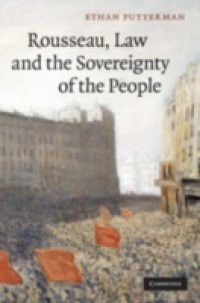Together with Plato's Republic, Jean-Jacques Rousseau's Social Contract is regarded as one of the most original examples of utopian political engineering in the history of ideas. Similar to the Republic, Rousseau's masterwork is better known today for its author's idiosyncratic view of political justice than its lessons on lawmaking or governance in any concrete sense. Challenging this common view, Rousseau, Law and the Sovereignty of the People examines the Genevan's contributions as a legislator and builder of institutions, relating his major ideas to issues and debates in twenty-first century political science. Ethan Putterman explores how Rousseau's just state would actually operate, investigating how laws would be drafted, ratified and executed, arguing that the theory of the Social Contract is more pragmatic and populist than many scholars assume today.

